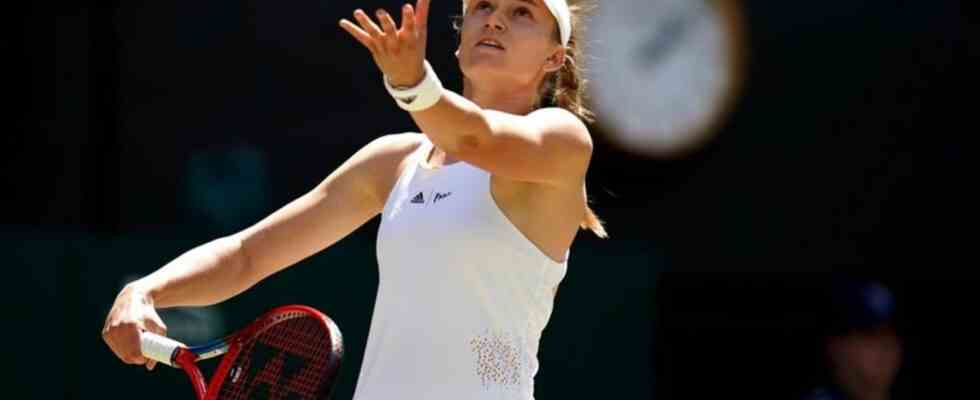tennis
Country of birth “not selected”: Rybakina and the question of Russia
Beat Maria Ons Jabeur in the Wimbledon final 3-6, 6-2, 6-2: Jelena Rybakina. Photo: John Walton/PA Wire/dpa
© dpa-infocom GmbH
For a long time, the exclusion of Russian professionals determined the debate about Wimbledon, now the tournament is ending on a political note. Russian-born Rybakina wins the title for Kazakhstan.
At the thought of her parents, Elena Rybakina still showed great emotions. After the suppressed joy at the surprising Wimbledon triumph on the pitch, the native Russian suddenly shed tears at the press conference – the 23-year-old, on the other hand, answered questions about Russia and Vladimir Putin stoically.
«From my side I can only say that I represent Kazakhstan. I didn’t choose where I was born,” said Rybakina, who has represented Kazakhstan since 2018.
Because of the Russian war of aggression in Ukraine, professionals from Russia and Belarus were excluded from Wimbledon. The debate that top players like Daniil Medvedev were missing and that the ATP and WTA organizations did not award world ranking points as a reaction, dominated the headlines for a long time before the tournament.
The fact that a player from Moscow won the women’s competition also gave the tournament a political note at the end. “Wimbledon ended with the very image it had so desperately tried to prevent,” wrote the British “Telegraph” and outlined the moment when Duchess Kate presented the Venus Rosewater dish to Rybakina as a trophy. “This women’s final produced a photo opportunity that had everyone at the Russian Embassy in London roaring over their glasses of vodka.”
«Kazakhstan supported me so much»
After her three-set final win against Tunisian Ons Jabeur, Rybakina was asked again if she condemned Russia’s war of aggression and Putin’s actions. “People believed in me. Kazakhstan supported me so much. Also today there was so much support, I saw the flags », she answered evasively. “I don’t know how to answer these questions.” When asked about the war earlier in the tournament, she said she wanted it to end as soon as possible. During Wimbledon, Ukrainian players like Lessia Zurenko reported emotionally about their worries about their families back home.
Like several other top professionals, Rybakina had changed nations long before the war, partly because of the prospect of greater funding. She hugged the President of the Kazakh Tennis Association, Bulat Utemuratov, in the stands. The head of state of the Central Asian country, Kassym-Jomart Tokayev, congratulated from afar on a “historic victory” and the first Grand Slam singles title for Kazakhstan.
Congratulations from Russia too
Rybakina quickly received congratulations for her victory from Russia as well. “It’s still the Russian school! She played with us for a long time and then in Kazakhstan,” said Shamil Tarpishchev, head of the Russian Tennis Association, to the Russian Internet portal “Championat”. “We have contributed a lot to their development,” he emphasized in the Russian newspaper “Sport-Express”. ‘Is there any grudge against her? no This is sports. Everyone chooses their own path. That’s her right.”
Rybakina emphasized that she was “grateful” to Kazakhstan for everything. When asked if she feared her victory in Russia could be used politically, she replied: “I don’t know what’s going to happen. There will always be some news, but I can’t do anything about it.”

